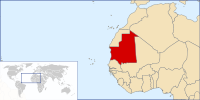Portal:Mauritania
The Mauritania Portal - بوابة موريتانيا
Mauritania, formally the Islamic Republic of Mauritania, is a sovereign country in Northwest Africa. It is bordered by the Atlantic Ocean to the west, Western Sahara to the north and northwest, Algeria to the northeast, Mali to the east and southeast, and Senegal to the southwest. By land area Mauritania is the 11th-largest country in Africa and 28th-largest in the world; 90% of its territory is in the Sahara. Most of its population of some 4.3 million lives in the temperate south of the country, with roughly a third concentrated in the capital and largest city, Nouakchott, on the Atlantic coast. The country's name derives from Mauretania, the Latin name for a region in the ancient Maghreb. It extended from central present-day Algeria to the Atlantic. Berbers occupied what is now Mauritania by beginning of the third century AD. Groups of Arab tribes migrated to this area in the late seventh century, bringing with them Islam, Arab culture, and the Arabic language. In the early 20th century, Mauritania was colonized by France as part of French West Africa. It achieved independence in 1960, but has since experienced recurrent coups and periods of military dictatorship. The 2008 Mauritanian coup d'état was led by General Mohamed Ould Abdel Aziz, who won subsequent presidential elections in 2009 and 2014. He was succeeded by General Mohamed Ould Ghazouani following the 2019 elections, head of an autocratic government with a very poor human rights record, particularly because of its perpetuation of slavery; the 2018 Global Slavery Index estimates there are about 90,000 slaves in the country (or 2.1% of the population).. Despite an abundance of natural resources, including iron ore and petroleum, Mauritania remains poor; its economy is based primarily on agriculture, livestock, and fishing. Mauritania is culturally and politically part of the Arab world; it is a member of the Arab League and Arabic is the official language. The official religion is Islam, and almost all inhabitants are Sunni Muslims. Despite its prevailing Arab identity, Mauritanian society is multiethnic; the Bidhan, or so-called "white moors", make up 30% of the population, while the Haratin, or so-called "black moors", comprise 40%. Both groups reflect a fusion of Arab-Berber ethnicity, language, and culture. The remaining 30% of the population comprises various sub-Saharan ethnic groups. (Full article...) Selected article -The ouguiya (Arabic: أوقية موريتانية (IPA: [uɡija]); sign: UM; code: MRU), at one time spelled "ougiya", is the currency of Mauritania. Each ouguiya constitutes five khoums (meaning "one fifth"). The current ouguiya was introduced in 2018, replacing the old ouguiya at a rate of 1 new ouguiya = 10 old ouguiya, which in turn replaced the CFA franc at a rate of 1 old ouguiya = 5 francs. The name ouguiya (أوقية) is the Hassaniya Arabic pronunciation of uqiyyah أُوقِية), meaning "ounce". (Full article...) This is a Good article, an article that meets a core set of high editorial standards.
Mauritania competed at the 2004 Summer Olympics in Athens, Greece, from 13 to 29 August 2004. The country's participation at Athens marked its sixth appearance in the Summer Olympics since its debut in the 1984 Summer Olympics. The delegation included two track and field athletes, Youba Hmeida and Aminata Kamissoko, who were both selected by wildcards after both failed to meet either the "A" or "B" qualifying standards. Hmeida was selected as the flag bearer for the opening ceremony. Neither of the Mauritanians progressed beyond the heats. (Full article...) CategoriesGeneral images -The following are images from various Mauritania-related articles on Wikipedia.
Related portalsWikiProjects
Topics in MauritaniaCities and towns
CommunesAssociated WikimediaThe following Wikimedia Foundation sister projects provide more on this subject:
Discover Wikipedia using portals | ||||||||||||||||||||||||||||||||||||||||||||||||||||||||||||||||












































